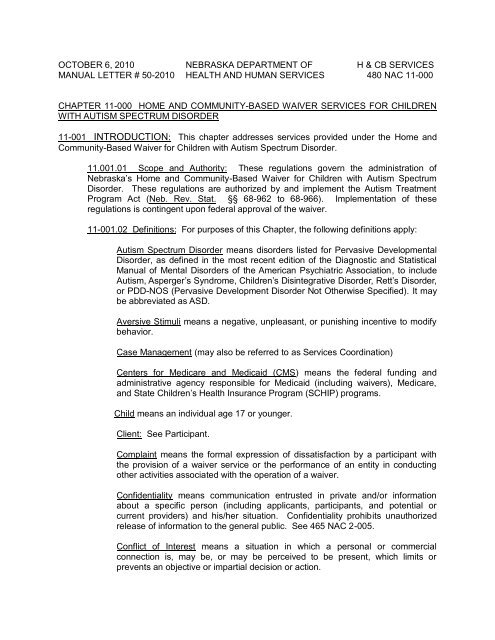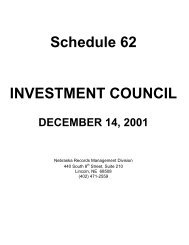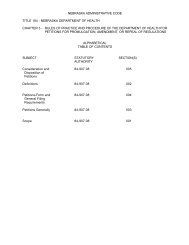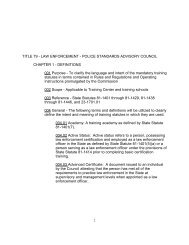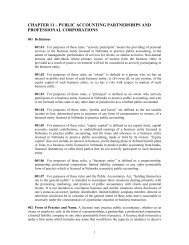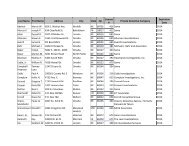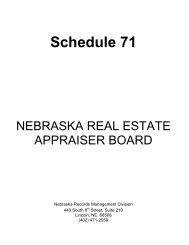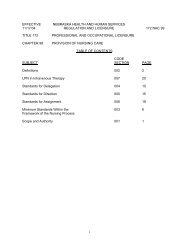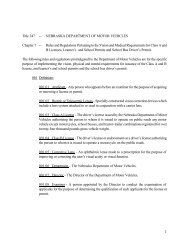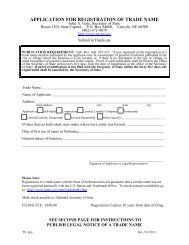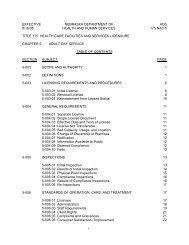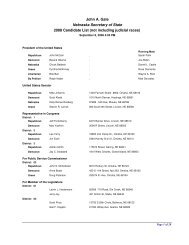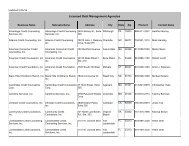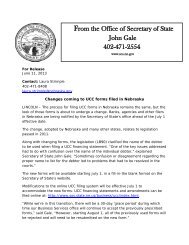480 NAC 11-000 - Nebraska Secretary of State
480 NAC 11-000 - Nebraska Secretary of State
480 NAC 11-000 - Nebraska Secretary of State
Create successful ePaper yourself
Turn your PDF publications into a flip-book with our unique Google optimized e-Paper software.
OCTOBER 6, 2010 NEBRASKA DEPARTMENT OF H & CB SERVICES<br />
MANUAL LETTER # 50-2010 HEALTH AND HUMAN SERVICES <strong>480</strong> <strong>NAC</strong> <strong>11</strong>-<strong>000</strong><br />
CHAPTER <strong>11</strong>-<strong>000</strong> HOME AND COMMUNITY-BASED WAIVER SERVICES FOR CHILDREN<br />
WITH AUTISM SPECTRUM DISORDER<br />
<strong>11</strong>-001 INTRODUCTION: This chapter addresses services provided under the Home and<br />
Community-Based Waiver for Children with Autism Spectrum Disorder.<br />
<strong>11</strong>.001.01 Scope and Authority: These regulations govern the administration <strong>of</strong><br />
<strong>Nebraska</strong>’s Home and Community-Based Waiver for Children with Autism Spectrum<br />
Disorder. These regulations are authorized by and implement the Autism Treatment<br />
Program Act (Neb. Rev. Stat. §§ 68-962 to 68-966). Implementation <strong>of</strong> these<br />
regulations is contingent upon federal approval <strong>of</strong> the waiver.<br />
<strong>11</strong>-001.02 Definitions: For purposes <strong>of</strong> this Chapter, the following definitions apply:<br />
Autism Spectrum Disorder means disorders listed for Pervasive Developmental<br />
Disorder, as defined in the most recent edition <strong>of</strong> the Diagnostic and Statistical<br />
Manual <strong>of</strong> Mental Disorders <strong>of</strong> the American Psychiatric Association, to include<br />
Autism, Asperger’s Syndrome, Children’s Disintegrative Disorder, Rett’s Disorder,<br />
or PDD-NOS (Pervasive Development Disorder Not Otherwise Specified). It may<br />
be abbreviated as ASD.<br />
Aversive Stimuli means a negative, unpleasant, or punishing incentive to modify<br />
behavior.<br />
Case Management (may also be referred to as Services Coordination)<br />
Centers for Medicare and Medicaid (CMS) means the federal funding and<br />
administrative agency responsible for Medicaid (including waivers), Medicare,<br />
and <strong>State</strong> Children’s Health Insurance Program (SCHIP) programs.<br />
Child means an individual age 17 or younger.<br />
Client: See Participant.<br />
Complaint means the formal expression <strong>of</strong> dissatisfaction by a participant with<br />
the provision <strong>of</strong> a waiver service or the performance <strong>of</strong> an entity in conducting<br />
other activities associated with the operation <strong>of</strong> a waiver.<br />
Confidentiality means communication entrusted in private and/or information<br />
about a specific person (including applicants, participants, and potential or<br />
current providers) and his/her situation. Confidentiality prohibits unauthorized<br />
release <strong>of</strong> information to the general public. See 465 <strong>NAC</strong> 2-005.<br />
Conflict <strong>of</strong> Interest means a situation in which a personal or commercial<br />
connection is, may be, or may be perceived to be present, which limits or<br />
prevents an objective or impartial decision or action.
OCTOBER 6, 2010 NEBRASKA DEPARTMENT OF H & CB SERVICES<br />
MANUAL LETTER # 50-2010 HEALTH AND HUMAN SERVICES <strong>480</strong> <strong>NAC</strong> <strong>11</strong>-001.02(1<strong>of</strong>4)<br />
Consent means that a document has been signed by the participant’s guardian<br />
or parent indicating preference for home and community-based services through<br />
the waiver.<br />
Cost-Sharing means the required out-<strong>of</strong>-pocket premium payment that a parent<br />
must pay for the service provided by the waiver.<br />
Criminal History/Background Investigation means a process that is undertaken to<br />
determine whether a person who would provide services has been convicted <strong>of</strong> a<br />
crime.<br />
Department means the <strong>Nebraska</strong> Department <strong>of</strong> Health and Human Services<br />
(may also be referred to as DHHS).<br />
DHHS: See Department.<br />
Documentation means written, dated, and authenticated evidence.<br />
Early Intensive Behavioral Intervention (EIBI) means a variety <strong>of</strong> therapies for<br />
young children with autism based on behavioral research and principles. EIBI is<br />
used to decrease problem behavior and to increase social, language, self-help,<br />
and cognitive skills.<br />
Fair Hearing means the administrative procedure that affords individuals the<br />
statutory right and opportunity to contest adverse decisions regarding Medicaid<br />
eligibility or benefits to a participant when denied eligibility, when eligibility is<br />
terminated, or when denied a covered benefit or service.<br />
Guardian means the legally-assigned caregiver <strong>of</strong> a minor child.<br />
Habilitation means services that are provided in order to assist an individual to<br />
acquire a variety <strong>of</strong> skills, including self-help, socialization, and adaptive skills.<br />
Habilitation is aimed at raising the level <strong>of</strong> physical, mental, and social<br />
functioning <strong>of</strong> an individual.<br />
In-home Services means services that are provided in the waiver participant’s<br />
home.<br />
Intermediate Care Facility for the Mentally Retarded (ICF/MR) means an<br />
institution licensed by DHHS that provides habilitation and health services for<br />
persons with mental retardation or related conditions.<br />
Legally Responsible Individual means a person who has a legal obligation under<br />
the provisions <strong>of</strong> state law to care for another person. Legal responsibility is<br />
defined by <strong>State</strong> law, and generally includes the parents (natural or adoptive) <strong>of</strong><br />
minor children, legally-assigned caregiver relatives <strong>of</strong> minor children, and<br />
sometimes spouses.
OCTOBER 6, 2010 NEBRASKA DEPARTMENT OF H & CB SERVICES<br />
MANUAL LETTER # 50-2010 HEALTH AND HUMAN SERVICES <strong>480</strong> <strong>NAC</strong> <strong>11</strong>-001.02(2<strong>of</strong>4)<br />
Level <strong>of</strong> Care means the specification <strong>of</strong> the minimum limitations in functioning<br />
amount <strong>of</strong> assistance that an individual must require in order to receive services<br />
in an institutional setting under the <strong>State</strong> plan.<br />
License means pro<strong>of</strong> <strong>of</strong> <strong>of</strong>ficial or legal permission to provide a service and<br />
issued or recognized by the <strong>Nebraska</strong> Department <strong>of</strong> Health and Human<br />
Services.<br />
Mechanical Restraint means any device attached or adjacent to an individual's<br />
body that s/he cannot easily remove that restricts freedom <strong>of</strong> movement or<br />
normal access to his/her body.<br />
Medicaid means the <strong>Nebraska</strong> Medical Assistance Program established to<br />
provide medical and other health-related services to aged, blind, or disabled<br />
persons, dependent children; and any other persons otherwise eligible who do<br />
not have sufficient income and resources to meet their medical needs.<br />
Medicaid Agency means the <strong>Nebraska</strong> Department <strong>of</strong> Health and Human<br />
Services – the state agency with responsibility for administering the <strong>Nebraska</strong><br />
Medical Assistance Program and managing Medicaid funding provided to the<br />
state.<br />
Medicaid <strong>State</strong> Plan means the comprehensive written document, developed and<br />
amended by DHHS and approved by the federal Centers for Medicare and<br />
Medicaid Services, which describes the nature and scope <strong>of</strong> the medical<br />
assistance program and provides assurances that DHHS will administer the<br />
program in compliance with federal requirements.<br />
Multidisciplinary Team (MDT) means a group coordinated by a Services<br />
Coordinator or school coordinator and composed <strong>of</strong> the participant and his/her<br />
family as appropriate, participant guardian, if applicable, treatment pr<strong>of</strong>essionals,<br />
and education autism pr<strong>of</strong>essionals.<br />
Participant means a child who has been determined eligible for and chooses to<br />
receive waiver services authorized in a Service Plan. (may also be referred to as<br />
Client)<br />
Personal Restraint means the application <strong>of</strong> physical force without the use <strong>of</strong> any<br />
device for the purposes <strong>of</strong> restraining the free movement <strong>of</strong> an individual's body.<br />
Primary Caregiver means the person who resides with the participant and is<br />
available on a 24-hour per day basis to assume responsibility for the care and<br />
supervision <strong>of</strong> the participant. This person provides this service without pay.<br />
This may include a caregiver who is employed outside the home if s/he retains<br />
“on-call” responsibility while away from the participant. The primary caregiver is<br />
physically with and responsible for meeting the participant’s needs at least 8<br />
hours in a routine 24-hour day. Compensation provided to a foster parent for<br />
care <strong>of</strong> a child is not considered as payment for the purpose <strong>of</strong> this definition.
OCTOBER 6, 2010 NEBRASKA DEPARTMENT OF H & CB SERVICES<br />
MANUAL LETTER # 50-2010 HEALTH AND HUMAN SERVICES <strong>480</strong> <strong>NAC</strong> <strong>11</strong>-001.02(3<strong>of</strong>4)<br />
Prior Authorized means a process where payment is made to a provider when<br />
authorization to furnish the item or service is obtained in advance from DHHS.<br />
Provider means an individual or agency authorized by the <strong>Nebraska</strong> Department<br />
<strong>of</strong> Health and Human Services to provide waiver services.<br />
Provider Agreement means the contract between the Medicaid agency and a<br />
service provider under which the provider or organization agrees to furnish<br />
services to Medicaid beneficiaries in compliance with state and federal<br />
requirements.<br />
Restraint means any physical intervention that is used to control acute, episodic<br />
behavior that restricts the movement or function <strong>of</strong> the individual or a portion <strong>of</strong><br />
the individual’s body.<br />
Seclusion means the involuntary confinement <strong>of</strong> an individual alone in a room or<br />
an area from which the individual is physically prevented from having contact<br />
with others or leaving.<br />
Services Coordinator means the person who is responsible for coordinating the<br />
waiver participant’s Service Plan and services received.<br />
Services Coordination means a set <strong>of</strong> activities that are undertaken to ensure<br />
that the waiver participant receives appropriate and necessary services. Under a<br />
Home and Community Based Waiver, these activities include (but are not<br />
necessarily limited to) assessment <strong>of</strong> service needs, Service Plan development,<br />
referral to services, and monitoring activities.<br />
Service Plan means a written document that specifies the waiver and other<br />
services furnished to meet the needs <strong>of</strong> and to assist a waiver participant to<br />
remain in the community. The plan describes the types <strong>of</strong> services to be<br />
furnished; the amount, frequency, and duration <strong>of</strong> each service; and the type <strong>of</strong><br />
provider to furnish each service.<br />
Slots means <strong>Nebraska</strong>’s quota <strong>of</strong> waiver participants.<br />
Time Out is a therapeutic procedure that involves either (1) removing an<br />
individual from an agitating situation in order to allow the individual to regaining<br />
self-control or (2) temporarily restricting access to positive reinforcers in<br />
accordance with an approved behavior management plan in order to reduce<br />
problem behavior.<br />
Transition means the process <strong>of</strong> moving or assisting a participant leaving one<br />
waiver to another waiver or to community resources.<br />
Waiver means <strong>Nebraska</strong>’s Home and Community-Based Services (HCBS)<br />
Waiver for Children with Autism Spectrum Disorder.
OCTOBER 6, 2010 NEBRASKA DEPARTMENT OF H & CB SERVICES<br />
MANUAL LETTER # 50-2010 HEALTH AND HUMAN SERVICES <strong>480</strong> <strong>NAC</strong> <strong>11</strong>-001.02(4<strong>of</strong>4)<br />
Waiver Staff means any person performing administrative duties related to the<br />
waiver.<br />
Waiver Year means the 12-month period that begins on the date the waiver takes<br />
effect and the 12-month period following each subsequent anniversary date <strong>of</strong><br />
the waiver.<br />
<strong>11</strong>-001.03 Participant Rights and Responsibilities: Participants in this waiver and their<br />
guardians or parents have the following rights and responsibilities:<br />
1. The right to apply for waiver services;<br />
2. The right to have a decision made and, if eligible, services provided in a<br />
timely manner;<br />
3. The right to receive equal protection under the law, not being subject to<br />
discrimination on the basis <strong>of</strong> race, color, national origin, sex, age, disability,<br />
religion, or political belief;<br />
4. The right to have program requirements and service options explained in<br />
understandable, accessible, and culturally appropriate terms and the<br />
responsibility to ask questions;<br />
5. The right and responsibility to participate in decision making in all aspects <strong>of</strong><br />
supports and services;<br />
6. The right and responsibility to participate to the greatest extent possible in the<br />
development, implementation, and continued delivery <strong>of</strong> the Service Plan;<br />
7. The right and responsibility to choose from among qualified providers;<br />
8. The right and responsibility to identify information to be shared with a<br />
provider;<br />
9. The right to have personal information kept confidential;<br />
10. The right to be treated with respect by all persons involved in the Children<br />
with Autism Spectrum Disorder waiver program;<br />
<strong>11</strong>. The right and responsibility to schedule service delivery with the provider and<br />
to notify the provider <strong>of</strong> any changes to that schedule;<br />
12. The right to receive services by the dates established in the Service Plan;<br />
13. The right to receive services as reflected in the Service Plan;<br />
14. The responsibility to notify the Services Coordinator when there are changes<br />
in health, living situation, and support system or when there is a change,<br />
concern, or dissatisfaction with a provider or a service;<br />
15. The right to receive timely notice <strong>of</strong> an action to reduce or end services; and<br />
16. The right to complain or appeal if it appears an error has been made or if the<br />
there is dissatisfaction with a decision.
OCTOBER 6, 2010 NEBRASKA DEPARTMENT OF H & CB SERVICES<br />
MANUAL LETTER # 50-2010 HEALTH AND HUMAN SERVICES <strong>480</strong> <strong>NAC</strong> <strong>11</strong>-002<br />
<strong>11</strong>-002 PARTICIPANT ELIGIBILITY CRITERIA: To be eligible for the waiver service, an<br />
individual must meet all <strong>of</strong> the following requirements:<br />
1. Be a child and have a medical diagnosis <strong>of</strong> an Autism Spectrum Disorder or<br />
educational verification <strong>of</strong> autism;<br />
2. Service initiated prior to the age <strong>of</strong> nine years;<br />
3. <strong>Nebraska</strong> resident and living at home with a caregiver;<br />
4. Meet the Intermediate Care Facility for the Mentally Retarded (ICF/MR) level <strong>of</strong><br />
care criteria showing care needs equal to those <strong>of</strong> Medicaid-funded ICF/MR<br />
residents;<br />
5. Be eligible for Medicaid through the <strong>Nebraska</strong> Medical Assistance Program;<br />
6. Participate in an assessment with a Services Coordinator, resulting in an outcomebased,<br />
cost-effective Service Plan;<br />
7. Have received an explanation <strong>of</strong> ICF/MR services and the waiver service and<br />
elected to receive the waiver service;<br />
8. Demonstrate progress toward the attainment <strong>of</strong> treatment goals;<br />
9. Participate in only one <strong>Nebraska</strong> Home and Community Based Services Waiver;<br />
10. When applicable, the parent/guardian meets cost sharing obligations; and<br />
<strong>11</strong>. Utilize an available waiver slot.<br />
The Services Coordinator must determine each <strong>of</strong> the above are met before authorizing<br />
services.<br />
<strong>11</strong>-002.01 Notice <strong>of</strong> Ineligibility: If the client does not meet eligibility criteria, the Services<br />
Coordinator must provide Form HHS-6, “Client Notice <strong>of</strong> Action” to the participant/legal<br />
representative. Notices to clients must contain:<br />
1. A clear statement <strong>of</strong> the action to be taken;<br />
2. A clear statement <strong>of</strong> the reason for the action;<br />
3. A specific regulation citation which supports the action; and<br />
4. A complete statement <strong>of</strong> the client’s right to appeal.<br />
<strong>11</strong>-003 ACCESS AND ELIGIBILTY: Children with Autism Spectrum Disorder and their families<br />
access the service through an application to the Department <strong>of</strong> Health and Human Services.<br />
<strong>11</strong>-003.01 Application: The applicant must complete the application form (<strong>480</strong>-<strong>000</strong>-600)<br />
to apply for this waiver and send the application to DHHS for processing. The<br />
application must be signed by the applicant’s parent/guardian and the date and time<br />
received documented by DHHS.<br />
<strong>11</strong>-003.02 <strong>State</strong>wide Availability: Waiver slots are allocated on a statewide basis.
OCTOBER 6, 2010 NEBRASKA DEPARTMENT OF H & CB SERVICES<br />
MANUAL LETTER # 50-2010 HEALTH AND HUMAN SERVICES <strong>480</strong> <strong>NAC</strong> <strong>11</strong>-003.03<br />
<strong>11</strong>-003.03 Initial Application and Selection Process: The initial selection begins with all<br />
applications postmarked by a pre-announced deadline date being drawn randomly and<br />
numbered in the order they are drawn. Completed and signed applications will be<br />
processed for eligibility in the numbered order until the pre-determined slots are filled.<br />
Remaining applicants will be notified in writing that they have been placed on the waiting<br />
list. Applications postmarked after the deadline will be accepted and numbered in order<br />
<strong>of</strong> receipt and placed on the waiting list. The Services Coordinator must:<br />
1. Accept applications <strong>of</strong> potential waiver participants and date and time stamp<br />
the application;<br />
2. Validate the diagnosis/verification <strong>of</strong> Autism Spectrum and screen application<br />
for ICF/MR level <strong>of</strong> care;<br />
3. Verify the client has active Medicaid or a pending Medicaid application. If<br />
application has not been made for Medicaid, the Services Coordinator must<br />
immediately refer client/legal representative to Medicaid intake.<br />
4. Meet with the child and parent/guardian within fifteen working days after the<br />
validation <strong>of</strong> ASD and level <strong>of</strong> care screen to complete the assessment <strong>of</strong><br />
services and supports, and finalize the ICF/MR level <strong>of</strong> care determination,<br />
provided that Medicaid status is open or pending.<br />
5. Determine child’s involvement in Early Intervention or special education;<br />
6. Notify initial participants who have been selected in writing <strong>of</strong> this decision<br />
and inform the remaining applicants in writing that they have been placed on<br />
a statewide participant waiting list; and<br />
7. Notify applicants who do not meet participant eligibility criteria <strong>of</strong> this decision<br />
by following the process outlined in <strong>480</strong> <strong>NAC</strong> <strong>11</strong>-002.01.<br />
<strong>11</strong>-003.04 Ongoing Application and Selection Process: For all completed and signed<br />
applications received following the initial application process, each application must be<br />
dated and time stamped in the order <strong>of</strong> receipt and added to the waiting list. As slots<br />
open, the process for applications to determine eligibility outlined in <strong>11</strong>-003.03 must be<br />
followed.<br />
<strong>11</strong>-003.05 Determination <strong>of</strong> Autism Spectrum Disorder: Autism Spectrum Disorder<br />
includes the disorders outlined in the DSM-IV TR for Pervasive Developmental Disorder:<br />
Autism Disorder, Asperger’s Syndrome Disorder; Children’s Disintegrative Disorder;<br />
Rett’s Disorder; and Pervasive Development Disorder – Not Otherwise Specified.<br />
Written documentation <strong>of</strong> Autism Spectrum Disorder, either through a medical diagnosis<br />
or educational verification, must be provided with the application and maintained in the<br />
applicant/participant file.<br />
<strong>11</strong>-003.05A Medical Diagnosis: The medical diagnosis must be made by a<br />
qualified, licensed, or certified diagnostician.
OCTOBER 6, 2010 NEBRASKA DEPARTMENT OF H & CB SERVICES<br />
MANUAL LETTER # 50-2010 HEALTH AND HUMAN SERVICES <strong>480</strong> <strong>NAC</strong> <strong>11</strong>-003.05B<br />
<strong>11</strong>-003.05B Educational Verification: The verification must be conducted by a<br />
school district with assessments done by a multidisciplinary team as defined by<br />
the <strong>Nebraska</strong> Department <strong>of</strong> Education. The process is outlined in the <strong>Nebraska</strong><br />
Department <strong>of</strong> Education Regulations and Standards for Special Education<br />
Programs, Rule 51. The verification may be a primary or secondary designation.<br />
<strong>11</strong>-003.06 Age: The child must be under the age <strong>of</strong> nine or have received early<br />
intensive behavioral intervention services before the child’s ninth birthday to be eligible<br />
for this waiver. This includes all services meeting the service definition in <strong>480</strong> <strong>NAC</strong> <strong>11</strong>-<br />
005.01 that were provided prior to application for this waiver regardless <strong>of</strong> the payer.<br />
The Services Coordinator is required to verify that the prior services meet the scope and<br />
frequency <strong>of</strong> the waiver service.<br />
<strong>11</strong>-003.07 Level <strong>of</strong> Care: The child must meet this Intermediate Care Facility for the<br />
Mentally Retarded (ICF/MR) criteria at the time <strong>of</strong> application and at each subsequent<br />
annual review:<br />
1. The child has a diagnosis <strong>of</strong> mental retardation or a related condition (defined in<br />
<strong>480</strong> <strong>NAC</strong> <strong>11</strong>-005.04A) which has been confirmed by prior diagnostic<br />
evaluations/standardized tests and sources independent <strong>of</strong> the ICF/MR; and<br />
2. The child can benefit from "active treatment" (defined in 42 CFR 483.440(a) and<br />
471 <strong>NAC</strong> 31-001.02). "Benefit from active treatment" means demonstrable<br />
progress in reducing barriers to less restrictive alternatives.<br />
<strong>11</strong>-003.07A Related Condition: A severe, chronic disability that meets all <strong>of</strong> the<br />
following conditions:<br />
1. It is attributable to:<br />
a. Cerebral palsy or epilepsy; or<br />
b. Any other condition, other than mental illness, (such as autism)<br />
found to be closely related to mental retardation because this<br />
condition results in impairment <strong>of</strong> general intellectual functioning<br />
or adaptive behavior similar to that <strong>of</strong> persons with mental<br />
retardation, and requires treatment or services similar to those<br />
required for these persons;<br />
2. It is manifested before the person reaches age 22;<br />
3. It is likely to continue indefinitely;<br />
4. In the case <strong>of</strong> a child under three years <strong>of</strong> age, results in at least one<br />
developmental delay;<br />
5. In the case <strong>of</strong> a person three years <strong>of</strong> age or older, results in substantial<br />
functional limitations in three or more <strong>of</strong> the following areas <strong>of</strong> major life<br />
activity:<br />
a. Self-care;<br />
b. Understanding and use <strong>of</strong> language;<br />
c. Learning;<br />
d. Mobility;<br />
e. Self-direction; or
OCTOBER 6, 2010 NEBRASKA DEPARTMENT OF H & CB SERVICES<br />
MANUAL LETTER # 50-2010 HEALTH AND HUMAN SERVICES <strong>480</strong> <strong>NAC</strong> <strong>11</strong>-003.07A<br />
f. Capacity for independent living; and<br />
6. Reflects the individual's need for a combination and sequence <strong>of</strong><br />
special, interdisciplinary, or generic care, treatment, or other services<br />
which are life-long or <strong>of</strong> an extended duration and are individually<br />
planned and coordinated.<br />
<strong>11</strong>-003.08 Medicaid Eligibility: The child must meet the eligibility requirements <strong>of</strong> the<br />
<strong>Nebraska</strong> Medical Assistance Program as outlined in 468 <strong>NAC</strong>, 469 <strong>NAC</strong>, or 477 <strong>NAC</strong>.<br />
<strong>11</strong>-003.09 Participant Financial Responsibility: Parents <strong>of</strong> children receiving this service<br />
who have the financial means must share in the cost <strong>of</strong> the service provided to their<br />
minor child. Children in foster care or subsidized adoption will be excluded. This will be<br />
done by a monthly premium set by a sliding fee scale and determined by DHHS based<br />
on the parent(s)’ income and the income <strong>of</strong> the child(ren) receiving the service. See 468<br />
<strong>NAC</strong>; 469 <strong>NAC</strong>; or 477 <strong>NAC</strong>; for timelines related to re-evaluation <strong>of</strong> income.<br />
<strong>11</strong>-003.09A Premium Payment:<br />
1. On-going premiums will be billed monthly and must be paid in order to be<br />
eligible for Medicaid;<br />
2. Premiums can be paid up to three months in advance;<br />
3. Premiums are due no later than the 21 st day <strong>of</strong> the month before the month<br />
for which the payment is designated (for example, premium payment for June<br />
must be paid no later than the 21 st day <strong>of</strong> May.)<br />
4. Children will be terminated from autism waiver eligibility after failure to pay<br />
the premium for 60 days.<br />
<strong>11</strong>-003.10 Waiver Eligibility Effective Date: The participant’s waiver eligibility period<br />
may begin no earlier than the date <strong>of</strong> the parent/guardian’s signature on the consent<br />
form and the date that Medicaid is effective. The consent form must be signed at initial<br />
determination only and remains valid as long as the waiver case is open. If the<br />
participant’s guardianship changes, a new, signed consent must be obtained.<br />
<strong>11</strong>-004 PLANNING FOR SERVICES<br />
<strong>11</strong>-004.01 Participation in Assessment and Service Plan: The child’s parent/guardian<br />
must be willing to participate in assessments <strong>of</strong> the child’s needs and planning for the<br />
child’s individualized service and treatment plan.<br />
<strong>11</strong>-004.02 Service Plan: The Services Coordinator must, together with the<br />
parent/guardian, school, and treatment pr<strong>of</strong>essionals, develop the Service Plan based<br />
upon assessment results. The Service Plan includes the autism treatment plan. Copies<br />
<strong>of</strong> the Service Plan are distributed to other persons and agencies at the direction <strong>of</strong> the<br />
participant’s parent/guardian. The Service Plan must be completed within fourteen<br />
calendar days <strong>of</strong> completing the assessment.
OCTOBER 6, 2010 NEBRASKA DEPARTMENT OF H & CB SERVICES<br />
MANUAL LETTER # 50-2010 HEALTH AND HUMAN SERVICES <strong>480</strong> <strong>NAC</strong> <strong>11</strong>-004.02<br />
(Exception: If a participant age three and under receives Services Coordination through<br />
the Early Development Network, the Individualized Family Service Plan (IFSP)<br />
developed for that program meets the Service Plan requirement for this waiver. The<br />
IFSP document must specify the needed service to be authorized through this waiver<br />
with a clear distinction between services funded through Education and services funded<br />
by Medicaid. A copy <strong>of</strong> the IFSP is maintained in the waiver case record.)<br />
<strong>11</strong>-004.03 Health and Welfare <strong>of</strong> Participant: The Service Plan must ensure the<br />
participant’s health and welfare, including consideration <strong>of</strong> acceptable risk with<br />
manageable back-up plans. If the participant’s health or welfare is in jeopardy, the<br />
service cannot be provided.<br />
<strong>11</strong>-004.03A Use <strong>of</strong> Restrictive Interventions for Behavior Management: The use<br />
<strong>of</strong> restrictive interventions as defined in <strong>480</strong> <strong>NAC</strong> <strong>11</strong>-005.04 must be prior<br />
approved by the participant’s parent or guardian and included in the Service<br />
Plan.<br />
<strong>11</strong>-004.04 Freedom <strong>of</strong> Choice: A participant may select any willing and qualified<br />
provider.<br />
<strong>11</strong>-004.05 Cost: The Services Coordinator must determine the cost <strong>of</strong> the Service Plan<br />
for the participant and determine that the estimated total monthly cost does not exceed<br />
the waiver annual cost limit approved by CMS. This must be done before the Consent is<br />
signed. Services included in calculating the cost <strong>of</strong> the Service Plan are the Medicaid<br />
non-waiver services <strong>of</strong> home health services (excluding therapies), private duty nursing,<br />
personal assistance service, medical transportation and all ongoing waiver services.<br />
<strong>11</strong>-004.06 Consent for Waiver Services: The Services Coordinator must provide an<br />
explanation <strong>of</strong> services in an ICF/MR and the service in this waiver to the<br />
parent/guardian and the parent/guardian must then give consent for the child’s<br />
participation in the waiver by signing the consent form (<strong>480</strong>-<strong>000</strong>-602).<br />
The form is signed at initial determination only, and remains valid as long as the waiver<br />
case is open. If the participant’s guardianship changes, a new, signed consent must be<br />
obtained. The participant’s waiver eligibility period may begin no earlier than the date <strong>of</strong><br />
the parent/guardian’s signature on the consent form.<br />
<strong>11</strong>-004.07 Coordination <strong>of</strong> Services with Education: Participants receiving the waiver<br />
service may also be involved in a special education program with the school. Waiver<br />
services cannot duplicate or replace services available through the school.<br />
<strong>11</strong>-004.07A Services Coordination Role: The Services Coordinator must involve<br />
the school personnel in developing the Service Plan.
OCTOBER 6, 2010 NEBRASKA DEPARTMENT OF H & CB SERVICES<br />
MANUAL LETTER # 50-2010 HEALTH AND HUMAN SERVICES <strong>480</strong> <strong>NAC</strong> <strong>11</strong>-004.08<br />
<strong>11</strong>-004.08 Authorization <strong>of</strong> Services: The service under this waiver must be prior<br />
authorized by DHHS based on the Service Plan, and may be authorized for up to a 12-<br />
month period. The service must not be authorized until the participant’s Medicaid<br />
eligibility has been determined and the waiver consent form has been signed.<br />
When the service has been authorized, a written description <strong>of</strong> the authorized service<br />
must be given to the provider. This must include, at a minimum, the amount and<br />
frequency <strong>of</strong> service provision, specific service components authorized, and authorized<br />
rate. A copy <strong>of</strong> the authorization must be provided to the provider and the participant’s<br />
parent/guardian with a copy maintained in the participant’s case file.<br />
<strong>11</strong>-004.09 Monitoring: Monitoring activities must be performed on an ongoing basis to<br />
continually evaluate the effectiveness <strong>of</strong> the Service Plan and to ensure quality service<br />
delivery.<br />
The Supervising Behavior Therapist will provide monthly progress notes to the Services<br />
Coordinator. The Services Coordinator will contact the parent/guardian to discuss the<br />
progress <strong>of</strong> all elements <strong>of</strong> the service plan.<br />
<strong>11</strong>-004.09A Role <strong>of</strong> the Services Coordinator: The Service Coordinator must:<br />
1. Contact the participant, at a minimum, bi-monthly by telephone or other<br />
communication, and conduct in-person visits at least once every six<br />
months. All in-person contacts must be at a time, date, and location<br />
convenient to the participant/parent/guardian. (Exception: An<br />
unannounced visit may occur as part <strong>of</strong> provider monitoring.);<br />
2. Ensure, by both participant and parent/guardian interview and<br />
observation, that the Service Plan continues to meet the participant’s and<br />
family’s needs and necessary referrals are being made;<br />
3. Review service usage and cost and revise the Service Plan as needed;<br />
4. Maintain regular communication with Medicaid eligibility staff to monitor<br />
ongoing Medicaid eligibility; and<br />
5. Whenever information is received that the care needs <strong>of</strong> a participant has<br />
changed, the Services Coordinator must determine whether a<br />
reassessment <strong>of</strong> the participant’s level <strong>of</strong> care is necessary.<br />
<strong>11</strong>-004.09B Reassessment <strong>of</strong> Level <strong>of</strong> Care: If a reassessment is needed<br />
during the course <strong>of</strong> the waiver year, the Services Coordinator must begin the<br />
reassessment process within two working days <strong>of</strong> receipt <strong>of</strong> the information.<br />
If no reassessment has been needed during the course <strong>of</strong> the waiver year, the<br />
Services Coordinator must review the participant’s continued ICF/MR Level <strong>of</strong><br />
Care eligibility at least every 12 months and completed prior to the end date <strong>of</strong><br />
the previous eligibility period. Results must be documented by updating the<br />
Level <strong>of</strong> Care form and Service Plan. The Services Coordinator must also review<br />
the consent document to assure that the parent/guardian signature is current.
OCTOBER 6, 2010 NEBRASKA DEPARTMENT OF H & CB SERVICES<br />
MANUAL LETTER # 50-2010 HEALTH AND HUMAN SERVICES <strong>480</strong> <strong>NAC</strong> <strong>11</strong>-004.09B<br />
If a reassessment determines that the participant does not continue to meet the<br />
ICF/MR Level <strong>of</strong> Care, a Notice <strong>of</strong> Action (<strong>480</strong>-<strong>000</strong>-604) must be sent to the<br />
parent/guardian and the case closed.<br />
<strong>11</strong>-004.10 Transition Planning: Six months before completion <strong>of</strong> the EIBI services, the<br />
Services Coordinator, school coordinator, the participant’s family, and others chosen by<br />
the family must meet to develop a transition plan for the participant. If a participant<br />
needs ongoing supportive services, the parent/guardian may choose to be referred to<br />
other programs and services.<br />
<strong>11</strong>-004.<strong>11</strong> Services Coordination Documentation: Services Coordination documentation<br />
must be maintained for each participant, retained for six years, and may consist <strong>of</strong> either<br />
paper and/or computer data. Documentation must include:<br />
1. Initial referral information;<br />
2. Waiver eligibility and authorization;<br />
3. ICF/MR level <strong>of</strong> care;<br />
4. Assessments and other functional documentation;<br />
5. Original Service Plan and updates; and<br />
6. All written notices to, and other communication with, the parent/guardian.<br />
<strong>11</strong>-005 SERVICE PROVIDED - Early Intensive Behavioral Intervention: Early Intensive<br />
Behavioral Intervention (EIBI) is the Medicaid habilitation service available to children eligible for<br />
this home and community-based waiver program.<br />
<strong>11</strong>-005.01 Service Description: EIBI is a variety <strong>of</strong> therapies for young children with<br />
autism to assist them in acquiring, retaining, and improving the self-help, socialization,<br />
and adaptive skills necessary to reside successfully in home and community-based<br />
settings. It is based on behavioral research and principles and used to decrease<br />
problem behavior and to increase social, language, self-help, and cognitive skills.<br />
A Supervising Behavioral Therapist directs and supervises a team including Lead<br />
Therapists and Applied Behavior Analysis Technicians, who provide the therapy as<br />
outlined in the participant’s treatment plan. The treatment plan is included in the waiver<br />
Service Plan. Each challenging behavior to be reduced and skill to be increased by the<br />
therapy is precisely defined with measurements before and during treatment to assess<br />
whether the treatment is working or whether it needs to be changed. Methods based on<br />
behavioral research are used to identify effective ways to motivate and teach the child.<br />
Functional assessments are used to identify events that trigger and reinforce challenging<br />
behavior.<br />
Parents or primary caregivers are trained on how to use EIBI procedures as part <strong>of</strong> the<br />
child's waiver service.
OCTOBER 6, 2010 NEBRASKA DEPARTMENT OF H & CB SERVICES<br />
MANUAL LETTER # 50-2010 HEALTH AND HUMAN SERVICES <strong>480</strong> <strong>NAC</strong> <strong>11</strong>-005.02<br />
<strong>11</strong>-005.02 Provision <strong>of</strong> Service: Providers must provide individualized services based<br />
on behavioral research and principles applicable to the specific needs and strengths <strong>of</strong><br />
the participant as determined by the participant’s treatment team. The individualized<br />
treatment goals must result in demonstrated progress toward the goals. The waiver<br />
service must be provided statewide to eligible participants for whom a slot is available.<br />
<strong>11</strong>-005.03 Place <strong>of</strong> Service: This service will be primarily provided in the participant’s<br />
residence but may also be in a clinical setting and/or other natural environment for the<br />
participant to assure a smooth therapeutic transition between environments.<br />
<strong>11</strong>-005.04 Provider Use <strong>of</strong> Restraints and Restrictive Intervention: The use <strong>of</strong> personal<br />
restraints and restrictive interventions by a waiver service provider must be prior<br />
approved by the parent or guardian in consultation with DHHS and included in the<br />
Service Plan signed by the parent/guardian.<br />
<strong>11</strong>-005.04B Use <strong>of</strong> Personal Restraints and Restrictive Interventions: Positive<br />
approaches in addressing behaviors with less restrictive methods must be attempted<br />
first and regularly applied until determined to be ineffective and documented in writing<br />
before the use <strong>of</strong> more restrictive measures. Methods must not be employed as<br />
punishment for the convenience <strong>of</strong> staff, a substitute for habilitation, or be reactive in<br />
design. Restrictive interventions must be implemented in a manner designed to<br />
protect the participant’s safety, dignity, well-being, and civil and human rights. A<br />
record must be kept on each use <strong>of</strong> a personal restraint and restrictive intervention<br />
with a participant.<br />
<strong>11</strong>-005.04B1 Allowable Interventions: The use <strong>of</strong> personal restraints, time-outs,<br />
and seclusionary time-outs as defined in this section will be allowable methods <strong>of</strong><br />
behavior management.<br />
Methods used must address behaviors that:<br />
1. Are obstacles to becoming more independent;<br />
2. Interfere with the ability to take part in habilitation; or<br />
3. May lead to self-injury or a threat to the safety <strong>of</strong> others.<br />
<strong>11</strong>-005.04B1a Personal Restraint: The use <strong>of</strong> a personal restraint involves a<br />
staff member holding an individual in a forceful manner that restricts the<br />
movement <strong>of</strong> an individual’s arms, legs, head, or other body parts. This does<br />
not include:<br />
1. Briefly holding an individual without undue force to help calm or<br />
comfort the individual,<br />
2. Holding the individual’s hand to safely escort the individual from one<br />
location to another, or<br />
3. Briefly physically guiding the individual’s hands when used as a<br />
prompting or teaching strategy.
OCTOBER 6, 2010 NEBRASKA DEPARTMENT OF H & CB SERVICES<br />
MANUAL LETTER # 50-2010 HEALTH AND HUMAN SERVICES <strong>480</strong> <strong>NAC</strong> <strong>11</strong>-005.04B1b<br />
<strong>11</strong>-005.04B1b Time-Out: Time-out is a therapeutic procedure that involves<br />
either:<br />
1. Removing an individual from an agitating situation in order to allow<br />
the individual to regain self-control; or<br />
2. Temporarily restricting access to positive reinforcers in accordance<br />
with an approved behavior management plan in order to reduce<br />
problem behavior.<br />
<strong>11</strong>-005.04B1c Seclusionary Time-Out: Seclusionary time-out is a therapeutic<br />
procedure that involves temporarily restricting access to positive reinforcers in<br />
order to reduce problem behavior by placing the individual in a time-out room<br />
or crib for a time-limited period (e.g., 2 minutes) while under the constant<br />
observation and supervision <strong>of</strong> a trained adult and in accordance with an<br />
approved behavior management plan. Seclusionary time-out is only used<br />
when less restrictive forms <strong>of</strong> time-out have been tried and been ineffective.<br />
<strong>11</strong>-005.05 Prohibited Interventions: The use <strong>of</strong> medicine, mechanical restraints,<br />
aversive stimuli, corporal punishment, abuse (verbal, physical, psychological, sexual)<br />
denial <strong>of</strong> an adequate diet, or a child in services disciplining another child served are not<br />
allowable habilitation techniques under the waiver and are therefore prohibited.<br />
<strong>11</strong>-005.05A Use <strong>of</strong> Medications: The use <strong>of</strong> any medication as a chemical<br />
restraint by a waiver service provider to control behavior or to restrict a child’s<br />
freedom <strong>of</strong> movement is not allowable. Medications that are prescribed as a<br />
standard treatment for a child’s medical or psychiatric condition are not<br />
considered restraints.<br />
<strong>11</strong>-005.06 Review Committee: The Supervising Behavior Therapist will utilize a review<br />
committee to provide prior review and approval <strong>of</strong> all policies and participant plans that<br />
include the use <strong>of</strong> restrictive procedures for the purpose <strong>of</strong> ensuring that participant<br />
rights are not violated. A current list <strong>of</strong> committee members and minutes <strong>of</strong> each<br />
meeting must be maintained.<br />
The Review Committee must include persons qualified to evaluate behavior<br />
management research studies/proposals and the technical adequacy <strong>of</strong> proposed<br />
behavior management interventions.<br />
<strong>11</strong>-005.07 Limitations: Medicaid does not cover EIBI:<br />
1. When the participant is in the hospital or other institution;<br />
2. As a convenience for the family or caregiver in place <strong>of</strong> a child care or respite<br />
care provider;<br />
3. When it duplicates other Medicaid <strong>State</strong> Plan services or other services<br />
available to the participant at no cost; or<br />
4. At any time the participant does not qualify for Medicaid or does not meet<br />
eligibility guidelines.
OCTOBER 6, 2010 NEBRASKA DEPARTMENT OF H & CB SERVICES<br />
MANUAL LETTER # 50-2010 HEALTH AND HUMAN SERVICES <strong>480</strong> <strong>NAC</strong> <strong>11</strong>-005.08<br />
<strong>11</strong>-005.08 Maximum Length <strong>of</strong> Service: The maximum length <strong>of</strong> service allowable is 36<br />
consecutive months. The participant must receive at least one unit <strong>of</strong> service each<br />
month to maintain enrollment in the waiver. The only exception to this would be in the<br />
event <strong>of</strong> temporary hospitalization <strong>of</strong> the participant or in the event <strong>of</strong> a temporary family<br />
disruption that prevents service provision.<br />
<strong>11</strong>-005.08A Exception Process: The parent/guardian may request an exception<br />
to the Services Coordinator and provide documentation <strong>of</strong> the circumstances.<br />
The Services Coordinator will make a decision and it must be documented in the<br />
participant’s file.<br />
<strong>11</strong>-005.09 Early Intensive Behavioral Intervention Rates: Rates are established by the<br />
Division <strong>of</strong> Medicaid & Long-Term Care. (<strong>480</strong>-<strong>000</strong>-681).
OCTOBER 6, 2010 NEBRASKA DEPARTMENT OF H & CB SERVICES<br />
MANUAL LETTER # 50-2010 HEALTH AND HUMAN SERVICES <strong>480</strong> <strong>NAC</strong> <strong>11</strong>-006<br />
<strong>11</strong>-006 PROVIDER ENROLLMENT AND GENERAL STANDARDS<br />
<strong>11</strong>-006.01 Resource Development: Resource Development is the process <strong>of</strong> recruiting,<br />
approving, and monitoring service providers to assure clients have a choice <strong>of</strong> providers.<br />
DHHS staff assigned this function are responsible for the following fundamental processes<br />
for providers: recruitment; approval and annual reviews; monitoring; billing instruction and<br />
record keeping. Resource Developers are also responsible for reviewing, investigating,<br />
and taking appropriate action on any complaints received about the provider.<br />
<strong>11</strong>-006.02 Provider Approval/Renewal Process: Before approval at both the initial<br />
approval and annual renewal <strong>of</strong> provider agreements, the following must be completed by<br />
staff with Resource Development responsibilities for all providers <strong>of</strong> service:<br />
1. Conduct an in-person interview which includes an on-site evaluation if the service is<br />
provided in the provider’s setting;<br />
2. Review and complete the Service Provider Agreement (<strong>480</strong>-<strong>000</strong>-630) and Provider<br />
Checklist (<strong>480</strong>-<strong>000</strong>-631) with the provider. Service provider agreements are effective<br />
up to 12 months, are never back-dated, and must be agreed upon and signed by all<br />
parties on or before the effective date <strong>of</strong> the agreement.<br />
3. Determine that all general and service-specific provider standards are met.<br />
4. Follow the identified process related to central register and criminal history checks<br />
outlined in <strong>480</strong> <strong>NAC</strong> <strong>11</strong>-006.04 and <strong>11</strong>-006.05.<br />
5. Obtain a completed and signed IRS Form W-9 and place it in the file.<br />
<strong>11</strong>-006.02A Service Agreement Revision: Providers must report/request changes to<br />
existing service agreements. An address change which does not affect the service<br />
location or a change in services provided may be changed manually and initialed by staff<br />
with Resource Development responsibilities on the original agreement.<br />
A change in provider name, Federal Tax Number (FTN), or Social Security number<br />
requires a new agreement and signature. For services provided outside <strong>of</strong> the client’s<br />
home, if the location changes, a new agreement, and service specific checklist, must be<br />
completed.<br />
<strong>11</strong>-006.03 Provider General Standards: All home and community-based services (HCBS)<br />
waiver providers are Medicaid providers (see 471 <strong>NAC</strong> 2-<strong>000</strong>) and must meet the following<br />
general provider standards:<br />
1. Follow all applicable <strong>Nebraska</strong> Department <strong>of</strong> Health and Human Services<br />
regulations (<strong>Nebraska</strong> Administrative Code Titles 465, 471, and <strong>480</strong>).<br />
2. Bill only for services which are authorized and actually provided.<br />
3. Submit billing documents after service according to provider agreement.<br />
4. Accept payment as payment in full and assure that the rate charged does not<br />
exceed the amount charged to private payers.<br />
5. Not provide services if s/he is the legally responsible relative (that is, spouse <strong>of</strong><br />
participant or parent <strong>of</strong> minor child who is a participant).
OCTOBER 6, 2010 NEBRASKA DEPARTMENT OF H & CB SERVICES<br />
MANUAL LETTER # 50-2010 HEALTH AND HUMAN SERVICES <strong>480</strong> <strong>NAC</strong> <strong>11</strong>-006.03<br />
6. Not discriminate against any employee, applicant for employment, or program<br />
participant or applicant because <strong>of</strong> race, age, color, religion, sex, handicap, or<br />
national origin, in accordance with 45 CFR Parts 80, 84, 90; and 41 CFR Part 60.<br />
7. Retain financial and statistical records for six years from date <strong>of</strong> service provision<br />
to support and document all claims.<br />
8. Allow federal, state, or local <strong>of</strong>fices responsible for program administration or<br />
audit to review service records, in accordance with 45 CFR 74.20 – 74.24; and<br />
42 CFR 431.107. Inspections, reviews, and audits may be conducted on site.<br />
9. Keep current any state or local license/certification required for service provision.<br />
10. Provide services as an independent contractor, if the provider is an individual,<br />
recognizing that s/he is not an employee <strong>of</strong> the Department or <strong>of</strong> the <strong>State</strong>.<br />
<strong>11</strong>. Agree and assure that any false claims (including claims submitted<br />
electronically), statement, documents, or concealment <strong>of</strong> material fact may be<br />
prosecuted under applicable state or federal laws (42 CFR 455.18).<br />
12. Respect every participant’s right to confidentiality and safeguard confidential<br />
information.<br />
13. Understand and accept responsibility for the participant’s safety and property.<br />
14. Not transfer the provider agreement to any other entity or person.<br />
15. Operate a drug free workplace.<br />
16. Not use any federal funds received to influence agency or congressional staff.<br />
17. Not engage in or have an ongoing history <strong>of</strong> criminal activity that may be harmful<br />
or may endanger individuals for whom s/he provides services. This may include<br />
a substantiated listing as a perpetrator on the child and/or adult central registries<br />
<strong>of</strong> abuse and neglect, and/or the sex <strong>of</strong>fender registries.<br />
18. Allow for DHHS Adult Protective Services Central Registry, the DHHS Child<br />
Central Register <strong>of</strong> Abuse and Neglect, the <strong>Nebraska</strong> Sex Offender website, and<br />
the License Information System checks on him/herself, family member if<br />
appropriate, or if an agency, agree to allow Department <strong>of</strong> Health and Human<br />
Services staff to review agency policies regarding hiring and reporting to ensure<br />
that appropriate procedures regarding abuse, neglect, and law violations are in<br />
place.<br />
19. Have the knowledge, experience, skills, and/or abilities necessary to perform the<br />
task(s) authorized.<br />
20. Report changes to appropriate DHHS or Operating Agency staff, for example, no<br />
longer able/willing to provide service, changes in participant function.<br />
21. Agree and assure that any suspected abuse or neglect will be reported to law<br />
enforcement and/or appropriate DHHS staff.<br />
<strong>11</strong>-006.04 Individual Providers: Prior to approval at both the initial approval and annual<br />
review, staff with Resource Development responsibilities must do the following:<br />
1. Obtain a completed Self-Disclosure/Felony/Misdemeanor <strong>State</strong>ment from the<br />
provider applicant (<strong>480</strong>-<strong>000</strong>-632). If service is to be provided in the provider’s<br />
home all household members age 19 or older must also complete the Self-<br />
Disclosure Felony/Misdemeanor <strong>State</strong>ment;
OCTOBER 6, 2010 NEBRASKA DEPARTMENT OF H & CB SERVICES<br />
MANUAL LETTER # 50-2010 HEALTH AND HUMAN SERVICES <strong>480</strong> <strong>NAC</strong> <strong>11</strong>-006.04<br />
2. Perform a criminal background check <strong>of</strong> the provider applicant prior to provider<br />
approval. If service is to be provided in the provider’s home, a criminal<br />
background check must be performed on all household members age 19 or<br />
older;<br />
3. Check the name <strong>of</strong> the provider applicant against the DHHS Adult Protective<br />
Services Central Registry, the DHHS Child Central Register <strong>of</strong> Abuse and<br />
Neglect, the <strong>Nebraska</strong> Sex Offender Registry, and the License Information<br />
System. If service is to be provided in the provider’s home, all household<br />
members age 19 or older must also have their names checked.<br />
<strong>11</strong>-006.05 Clinic/Agency/Facility Providers: Prior to approval at both the initial approval<br />
and annual review, staff with Resource Development responsibilities must do the following:<br />
1. Review evidence that the clinic’s/agency’s/facility’s employees have completed a<br />
Self-Disclosure/Felony/Misdemeanor <strong>State</strong>ments from the provider applicant (<strong>480</strong>-<br />
<strong>000</strong>-632). Employees must complete this statement annually.<br />
2. Review evidence that criminal background checks have been completed on the<br />
clinic/agency/facility employees.<br />
3. Review evidence that the clinic’s/agency’s/facility’s employees have been cleared<br />
against the DHHS Adult Protective Services Central Registry, the DHHS Child<br />
Central Register <strong>of</strong> Abuse and Neglect, the <strong>Nebraska</strong> Sex Offender Website, and<br />
the License Information System.<br />
4. Review the clinic’s/agency/facility’s policy that ensures criminal background,<br />
registry, and website checks are completed on each employee. Review the policy<br />
<strong>of</strong> the clinic/agency/facility to determine that safeguards are in place to protect the<br />
well-being <strong>of</strong> waiver clients. This policy must assure that no staff person identified<br />
through this process poses a danger to the health and safety <strong>of</strong> any client. If<br />
assurances are not in place, the provider agreement must not be approved or any<br />
existing waiver provider agreement must be terminated.<br />
<strong>11</strong>-006.06 Specific Criminal History: Staff with Resource Development responsibilities<br />
must deny or terminate service provider approval immediately when conviction has<br />
occurred in the following areas:<br />
1. Child pornography;<br />
2. Child or adult abuse;<br />
3. Driving Under the Influence: Two or more within the last five years;<br />
4. Domestic violence;<br />
5. Shoplifting after age 19 within the last three years;<br />
6. Felony fraud within the last 10 years;<br />
7. Misdemeanor fraud within the last five years;<br />
8. Termination <strong>of</strong> provider status for cause from any DHHS program within the last 10<br />
years;<br />
9. Possession <strong>of</strong> any controlled substance within the last five years;<br />
10. Possession <strong>of</strong> a controlled substance with intent to deliver within the last 10 years;<br />
<strong>11</strong>. Felony or misdemeanor assault without a weapon in the last 10 years;<br />
12. Felony or misdemeanor assault with a weapon in the last 15 years;
OCTOBER 6, 2010 NEBRASKA DEPARTMENT OF H & CB SERVICES<br />
MANUAL LETTER # 50-2010 HEALTH AND HUMAN SERVICES <strong>480</strong> <strong>NAC</strong> <strong>11</strong>-006.06<br />
13. Prostitution or solicitation <strong>of</strong> prostitution within the last five years;<br />
14. Felony or misdemeanor robbery or burglary within the last 10 years;<br />
15. Rape or sexual assault; or<br />
16. Homicide.<br />
If other pending charges or convictions are found or charges listed above are pending,<br />
the situation must be reviewed to determine whether the participant’s safety is in<br />
jeopardy and reasons for approval/non-approval documented.<br />
<strong>11</strong>-006.07 Abuse/Neglect Registry: Before initial approval as a provider and at the<br />
annual renewal, a check <strong>of</strong> the DHHS Adult Protective Services Central Registry, the<br />
DHHS Child Central Register <strong>of</strong> Abuse and Neglect, the <strong>Nebraska</strong> Sex Offenders<br />
Website, and the License Information System must be done on all individual providers.<br />
<strong>11</strong>-006.07A Reason for Denial/Termination: A service provider’s approval must be<br />
denied/terminated immediately if a registry/website report on the provider as<br />
perpetrator is shown as substantiated.<br />
If a protective services investigation is in progress, the situation must be reviewed<br />
to determine if the participant’s safety is in jeopardy. If so, the provider’s approval<br />
must be denied/terminated immediately.<br />
<strong>11</strong>-006.08 Disclosure <strong>of</strong> Information by Providers: Staff with Resource Development<br />
responsibilities must assure that providers disclose the following information as required<br />
under 42 CFR 455, Subpart B. See 471 <strong>NAC</strong> 2-006.<br />
1. Ownership and control;<br />
2. Business transactions; and<br />
3. The providers' owners and other persons convicted <strong>of</strong> crimes against<br />
Medicare, Medicaid, or Title XX (Social Services Block Grant) programs.<br />
<strong>11</strong>-006.08A Excluded Providers: Staff with Resource Development<br />
responsibilities must assure that providers do not appear on US Department <strong>of</strong><br />
Health & Human Services Office <strong>of</strong> Inspector General’s List <strong>of</strong> Excluded<br />
Individuals/Entities.<br />
<strong>11</strong>-006.09 Previous Termination <strong>of</strong> Provider: A provider’s approval must be<br />
denied/terminated if information is received that termination <strong>of</strong> provider status has<br />
occurred for cause from any DHHS program within the last ten years.<br />
<strong>11</strong>-006.10 Agency as a Provider: If an agency as a provider plans to subcontract with<br />
another organization or individual providers to provide a portion <strong>of</strong> service delivery, the<br />
agency provider must provide the following information to DHHS:<br />
1. Name <strong>of</strong> subcontractor; and<br />
2. Federal identification number, Social Security number, and any<br />
licensure information (for example, RN license number).
OCTOBER 6, 2010 NEBRASKA DEPARTMENT OF H & CB SERVICES<br />
MANUAL LETTER # 50-2010 HEALTH AND HUMAN SERVICES <strong>480</strong> <strong>NAC</strong> <strong>11</strong>-006.10<br />
The agency provider is responsible for the performance and actions <strong>of</strong> its<br />
subcontractor(s) and the subcontractor(s) must comply with these regulations.<br />
<strong>11</strong>-006.<strong>11</strong> Provider Related to Participant: A legally responsible relative, for example,<br />
the parent <strong>of</strong> a child age 18 or younger who is a waiver participant, cannot be approved<br />
specifically as a provider for his/her child who is a Medicaid waiver participant.<br />
Other family members who meet the provider qualifications may be a provider with these<br />
exceptions: a stepparent <strong>of</strong> the Medicaid waiver participant, a foster parent <strong>of</strong> the<br />
Medicaid waiver participant, and any other legally responsible guardian <strong>of</strong> the Medicaid<br />
waiver participant.<br />
Should there be any question as to whether a paid provider falls in any <strong>of</strong> the categories<br />
listed, the Services Coordinator must request a determination. DHHS legal counsel will<br />
make the determination.<br />
<strong>11</strong>-006.12 Provider Denial/Termination: If the provider does not meet all <strong>of</strong> the provider<br />
standards for the service to be provided, the following must be completed:<br />
1. Document the reason for the denial/termination;<br />
2. Provide written notice to the provider which includes:<br />
a. Explanation <strong>of</strong> the reasons for the denial/termination;<br />
b. Citation <strong>of</strong> the regulations on which the denial/termination was based; and<br />
c. Notification <strong>of</strong> the provider’s right to appeal the decision/action.<br />
<strong>11</strong>-006.13 Voluntary Withdrawal: A written notice to the potential provider is not<br />
required if s/he voluntarily withdraws before approval.<br />
<strong>11</strong>-006.14 Terminating a Provider Agreement: Either DHHS or the provider may<br />
terminate an agreement by giving at least 30 days advance written notice. The 30-day<br />
requirement may be waived for the provider in the case <strong>of</strong> emergencies such as illness,<br />
death, injury, fire, or other natural disaster. If the provider violates any <strong>of</strong> the provisions<br />
<strong>of</strong> the Service Provider Agreement, then the Agreement may be terminated immediately.<br />
If there are any damages arising from the violation, DHHS may pursue legal remedies to<br />
recover the damages. Any money due to the provider which accrued before the violation<br />
may be <strong>of</strong>fset against the damages.<br />
When an agreement is terminated , the steps in <strong>480</strong> <strong>NAC</strong> <strong>11</strong>-006.12 must be followed.<br />
<strong>11</strong>-006.15 Provider Appeals: All Medicaid providers have the right to appeal any<br />
decision/action that has a direct adverse effect on the provider (471 <strong>NAC</strong> 2-003).<br />
Appealable actions include but are not limited to a determination that a provider standard<br />
is not met or disallowance <strong>of</strong> a claim. Providers may not appeal service authorization<br />
terminations related to a participant’s eligibility or choice <strong>of</strong> provider.
OCTOBER 6, 2010 NEBRASKA DEPARTMENT OF H & CB SERVICES<br />
MANUAL LETTER # 50-2010 HEALTH AND HUMAN SERVICES <strong>480</strong> <strong>NAC</strong> <strong>11</strong>-006.15<br />
A provider must request a hearing in writing within 90 days <strong>of</strong> the date that the provider<br />
notification letter is postmarked. The provider must appeal the state’s request for<br />
refunds within 30 days <strong>of</strong> the date the provider notification letter is mailed. To request a<br />
hearing, the provider must submit a written request to the DHHS Director <strong>of</strong> the Division<br />
<strong>of</strong> Medicaid & Long-Term Care, identifying:<br />
1. The basis <strong>of</strong> the appeal;<br />
2. The participant(s) involved, if applicable; and<br />
3. The name <strong>of</strong> the Services Coordinator.<br />
<strong>11</strong>-006.16 Individual Provider Record Keeping: Providers <strong>of</strong> waiver services must retain<br />
the following documentation for six years:<br />
1. Documentation which supports provision <strong>of</strong> services to each participant served<br />
under the waiver, including but not limited to, services plans and reports; service<br />
authorizations, and billing records; and<br />
2. Service Provider Agreement.<br />
<strong>11</strong>-006.17 DHHS Documentation: DHHS must maintain documentation on each<br />
provider for six years. Documentation must include:<br />
1. Provider agreements ;<br />
2. Verification <strong>of</strong> Central Registry and criminal background checks;<br />
3. Self-Disclosure Felony/Misdemeanor <strong>State</strong>ments;<br />
4. Written notices to, and other communication with, the provider;<br />
5. Activities related to services delivery monitoring;<br />
6. Narrative documentation (for example, waiver staff decisions and actions; and<br />
other factual, relevant information); and<br />
7. Billing and payment records.
OCTOBER 6, 2010 NEBRASKA DEPARTMENT OF H & CB SERVICES<br />
MANUAL LETTER # 50-2010 HEALTH AND HUMAN SERVICES <strong>480</strong> <strong>NAC</strong> <strong>11</strong>-007<br />
<strong>11</strong>-007 PROVIDER TYPES, QUALIFICATIONS, AND POLICIES<br />
<strong>11</strong>-007.01 Provider Type Qualifications: In addition to the general provider standards<br />
outlined in <strong>480</strong> <strong>NAC</strong>-<strong>11</strong>.006, autism waiver providers must meet specific qualifications<br />
based on the provider type. Three provider types are included as providers in this<br />
waiver:<br />
1. Supervising Behavior Therapist<br />
2. Lead Therapist<br />
3. Applied Behavior Analyst Technician<br />
Providers may enroll as only one provider type.<br />
<strong>11</strong>-007.02 Supervising Behavior Therapist: This provider must have:<br />
1. Earned a Doctoral or master’s degree (Ed.D., Ph.D., Psy.D ; M.A., M.S., M.S.W.)<br />
in Behavior Analysis, Education, , Occupational/Physical Therapy, Psychology,<br />
Rehabilitation Therapy, Speech Pathology/Speech Therapy, or Social Work; and<br />
2. Completed 9 months <strong>of</strong> supervised practicum experience in which the primary<br />
duties were:<br />
a. Designing, implementing and monitoring programs for individuals with<br />
autism spectrum disorders, and/or,<br />
b. Overseeing the implementation <strong>of</strong> programs for individuals with autism<br />
spectrum disorders by others. Supervised experience includes face-t<strong>of</strong>ace<br />
meetings for at least two hours every two weeks with a qualified<br />
service provider; and<br />
3. Completed at least 60 hours <strong>of</strong> direct experience working with children with<br />
Autism Spectrum Disorder. Demonstration that the experience criteria are met by<br />
one <strong>of</strong> the following:<br />
a. Documentation as an active Board Certified Behavior Analyst (BCBA) by<br />
the National Behavior Analyst Certification Board, OR<br />
b. Documentation as a Fellow <strong>of</strong> the Association for Behavior Analysis, OR<br />
c. Graduate school transcripts and training certificates reflecting the<br />
following coursework <strong>of</strong> at least 225 classroom hours <strong>of</strong> graduate-level<br />
instruction in the following areas:<br />
(1) Ethical considerations – 15 hours;<br />
(2) Definition & characteristics and principles, processes & concepts<br />
<strong>of</strong> empirically- based service provision for individuals with autism<br />
spectrum disorders - 45 hours;<br />
(3) Behavioral assessment <strong>of</strong> autism spectrum disorders and<br />
selecting intervention, outcomes and strategies - 35 hours;<br />
(4) Empirical (data-based) evaluation <strong>of</strong> interventions - 20 hours;<br />
(5) Measurement <strong>of</strong> behavior and displaying & interpreting behavioral<br />
data - 20 hours;<br />
(6) Behavioral change procedures and systems support 45 hours;<br />
(7) Discretionary (additional courses in relevant areas such as autism,<br />
human development, mental disorders, or developmental<br />
disabilities) – 45 hours.
OCTOBER 6, 2010 NEBRASKA DEPARTMENT OF H & CB SERVICES<br />
MANUAL LETTER # 50-2010 HEALTH AND HUMAN SERVICES <strong>480</strong> <strong>NAC</strong> <strong>11</strong>-007.03<br />
<strong>11</strong>-007.03 Lead Therapist: This provider must have:<br />
1. Documentation <strong>of</strong> being either a Board Certified Behavior Analyst (BCBA) by the<br />
National Behavior Analyst Certification Board or a Board Certified Assistant<br />
Behavioral Analyst (BCaBA); or<br />
2. Completed at least 60 hours <strong>of</strong> supervised experience working with children with<br />
Autism Spectrum Disorder and been trained to mastery criterion in implementing<br />
behavioral interventions and earned a baccalaureate degree in one <strong>of</strong> the<br />
following:<br />
a. Behavior Analysis;<br />
b. Education;<br />
c. Occupational or Physical Therapy;<br />
d. Psychology;<br />
e. Rehabilitation Therapy;<br />
f. Speech Pathology/Speech Therapy; or<br />
g. Social Work.<br />
<strong>11</strong>-007.04 Applied Behavior Analysis Technician: This provider must have:<br />
1. Completed college coursework or program instruction in Applied Behavior<br />
Analysis; and<br />
2. Been trained to mastery criterion in implementing behavioral interventions.<br />
<strong>11</strong>-007.05 Provider Policies and Procedures: The provider must have written policies<br />
and procedures on management <strong>of</strong> inappropriate participant behaviors. These policies<br />
and procedures must specify and define approved intervention methods in compliance<br />
with these regulations and include a description <strong>of</strong> the mechanism for monitoring the use<br />
<strong>of</strong> the intervention. These policies must be in writing and include the following:<br />
1. Prohibit use <strong>of</strong> mechanical restraints, aversive stimuli, abuse (physical, verbal,<br />
psychological, sexual), corporal punishment, denial <strong>of</strong> an adequate diet, and a<br />
child in services disciplining another child served;<br />
2. Specify and define intervention procedures that are approved to be utilized;<br />
3. Specify that less restrictive methods must be attempted and regularly applied and<br />
determined to be ineffective before the use <strong>of</strong> more restrictive measures and how<br />
that will be documented along with reasons for the use <strong>of</strong> more restrictive<br />
measures are necessary;<br />
4. Specify staff training requirements;<br />
5. Specify that methods to manage inappropriate behavior must be used only in a<br />
manner that protects the safety, well being, and civil and human rights <strong>of</strong> the<br />
participant;<br />
6. Provide that these policies and procedures must be communicated to and<br />
available to all staff, participants, family, and/or guardians;<br />
7. Define and specify procedures governing use <strong>of</strong> restrictive or intrusive measures<br />
such as personal restraints, time out procedures, and emergency use <strong>of</strong> restrictive<br />
measures; and
OCTOBER 6, 2010 NEBRASKA DEPARTMENT OF H & CB SERVICES<br />
MANUAL LETTER # 50-2010 HEALTH AND HUMAN SERVICES <strong>480</strong> <strong>NAC</strong> <strong>11</strong>-007.05<br />
8. Specify that each plan utilizing personal restraint or restrictive intervention<br />
procedures must be reviewed and approved before implementation by the<br />
participant's treatment team, the parent or participant's legal guardian, and the<br />
agency's review committee.<br />
<strong>11</strong>-007.05A Provider Training: All providers must be trained on the use <strong>of</strong><br />
restraints and restrictive interventions before providing the waiver service.<br />
<strong>11</strong>-008 CONFLICT OF INTEREST: This section identifies areas <strong>of</strong> possible conflict <strong>of</strong> interest:<br />
<strong>11</strong>-008.01 Applicant/Participant Related to Waiver Staff: A waiver staff person performing<br />
services coordination activities must not provide services coordination activities for an<br />
applicant/participant to whom s/he is related or has a personal relationship which might<br />
affect the assessment or plan.<br />
<strong>11</strong>-008.02 Provider Related to Waiver Staff: A waiver staff person must not approve, reapprove,<br />
evaluate, or negotiate provider agreements with providers to whom s/he is<br />
related.<br />
<strong>11</strong>-008.03 Staff as Legal Representative: No employee <strong>of</strong> DHHS or entity contracted to<br />
conduct waiver administrative duties may serve as guardian, conservator, power <strong>of</strong><br />
attorney, or protective payee <strong>of</strong> a waiver participant for whom s/he:<br />
1. Determines eligibility;<br />
2. Authorizes services or assistance;<br />
3. Provides direct service; and/or<br />
4. Has any other pr<strong>of</strong>essional relationship which may be considered a conflict <strong>of</strong><br />
interest.<br />
<strong>11</strong>-008.04 Waiver Staff as Board Members: If any waiver staff serves on a Board <strong>of</strong><br />
Directors or a standing committee <strong>of</strong> a community organization that votes on issues, s/he<br />
must abstain from any decision making or voting on issues related to this waiver.
OCTOBER 6, 2010 NEBRASKA DEPARTMENT OF H & CB SERVICES<br />
MANUAL LETTER # 50-2010 HEALTH AND HUMAN SERVICES <strong>480</strong> <strong>NAC</strong> <strong>11</strong>-009<br />
<strong>11</strong>-009 ADVERSE DECISIONS ON PARTICIPANT ELIGIBILITY<br />
<strong>11</strong>-009.01 Participant Notification: Persons who request, apply for, or receive services<br />
may request a hearing on any adverse action or inaction. These may include, but are<br />
not limited to, a potential waiver participant being denied services, a waiver participant’s<br />
services being reduced, or a waiver participant being determined ineligible for continued<br />
waiver services. The Services Coordinator must send written notice <strong>of</strong> denial, reduction,<br />
or termination <strong>of</strong> services to the participant and parent/guardian. The notice used is<br />
Form HHS-6. The notice must contain:<br />
1. A clear statement <strong>of</strong> the action to be taken;<br />
2. A clear statement <strong>of</strong> the reason for the action;<br />
3. A specific regulation citation that supports the action;<br />
4. A complete statement <strong>of</strong> the participant/guardian's right to request a hearing;<br />
and<br />
5. A clear statement that if a hearing is requested within ten days following the<br />
date the notice <strong>of</strong> finding is mailed, the adverse action will not be carried out<br />
until a fair hearing decision is rendered.<br />
Notice <strong>of</strong> reduction or termination <strong>of</strong> services must be mailed at least ten calendar days<br />
before the effective date <strong>of</strong> action. Exception: If the termination <strong>of</strong> waiver services is<br />
because <strong>of</strong> loss <strong>of</strong> Medicaid eligibility, the effective date <strong>of</strong> the termination must match<br />
the effective date <strong>of</strong> the termination <strong>of</strong> Medicaid eligibility.<br />
If the adverse action is to deny acceptance <strong>of</strong> a waiver referral, the Services Coordinator<br />
must send the notice to the applicant as soon as the decision is made.<br />
<strong>11</strong>-009.01A Reasons for Denial/Termination: The Services Coordinator must<br />
provide a notice <strong>of</strong> denying or terminating waiver eligibility in these circumstances:<br />
1. The unavailability <strong>of</strong> a waiver slot;<br />
2. The participant has no waiver service need;<br />
3. The participant’s needs are being met by another source;<br />
4. The parent /guardian has not supplied needed information to complete the<br />
eligibility process;<br />
5. The participant fails to meet the specified eligibility criteria;<br />
6. A Service Plan that protects the participant’s health and welfare cannot be<br />
developed/maintained;<br />
7. The parent/guardian has not signed necessary forms consenting to waiver<br />
services; or<br />
8. The participant moves out <strong>of</strong> <strong>Nebraska</strong>.<br />
<strong>11</strong>-009.01B Advance Notice Not Required: The Services Coordinator must<br />
provide a Notice <strong>of</strong> Action (<strong>480</strong>-<strong>000</strong>-604) to close a case, but advance notice is not<br />
required in the following circumstances. However, the notice must be provided no<br />
later than the date <strong>of</strong> the closure.<br />
1. The death <strong>of</strong> a participant;<br />
2. The Services Coordinator receives a clear written statement signed by a<br />
parent/guardian that the participant no longer wishes services;
OCTOBER 6, 2010 NEBRASKA DEPARTMENT OF H & CB SERVICES<br />
MANUAL LETTER # 50-2010 HEALTH AND HUMAN SERVICES <strong>480</strong> <strong>NAC</strong> <strong>11</strong>-009.01B<br />
3. The participant has been admitted to an ICF/MR or hospital on a long-term<br />
basis;<br />
4. The participant’s whereabouts are unknown;<br />
5. The Services Coordinator establishes the fact that the participant has been<br />
accepted for Medicaid services by another state; or<br />
6. An authorization period is ending and the participant’s parent/guardian has<br />
not acted upon a request for a level <strong>of</strong> care and plan <strong>of</strong> services and<br />
supports review.<br />
<strong>11</strong>-009.01C Advance Notice in Cases <strong>of</strong> Probable Fraud: At least five days<br />
advance written notice must be given if the Services Coordinator has facts<br />
indicating that action should be taken to discontinue, suspend, terminate, or<br />
reduce assistance because <strong>of</strong> probable fraud by the participant; and the facts<br />
have been verified where possible through collateral sources.<br />
<strong>11</strong>-009.01D Provider Notice: When a participant’s services are being changed<br />
or terminated, the Services Coordinator must provide written notice to the<br />
provider <strong>of</strong> the change in service provision or termination <strong>of</strong> payment for waiver<br />
services.<br />
<strong>11</strong>-009.02 Participant Appeals <strong>of</strong> Adverse Actions: The Department <strong>of</strong> Health and<br />
Human Services must provide opportunities for fair hearings as defined in 42 CFR 431,<br />
Subpart E, to participants or their legal representatives who are not given the choice <strong>of</strong><br />
home and community-based services as an alternative to ICF/MR services or who are<br />
denied the services <strong>of</strong> their choice (see 465 <strong>NAC</strong> 2-001.02 and 465 <strong>NAC</strong> 6-<strong>000</strong>).<br />
A participant’s parent/guardian has the right to appeal the following Services<br />
Coordination decisions/actions:<br />
1. Failure to act upon a request within the mandated time period;<br />
2. Failure to <strong>of</strong>fer the choice between Home and Community-Based Waiver<br />
Services and ICF/MR services;<br />
3. Denial <strong>of</strong> eligibility;<br />
4. Denial, termination, or reduction <strong>of</strong> services; or<br />
5. Termination <strong>of</strong> the waiver case.<br />
<strong>11</strong>-009.03 Continuation <strong>of</strong> Services: If the participant submits a request for a fair<br />
hearing in accordance with the timeframe prescribed in fair hearing policy, the adverse<br />
action must not take place until the hearing decision is rendered. If services have<br />
already been terminated, they must be reinstated until the hearing decision.


